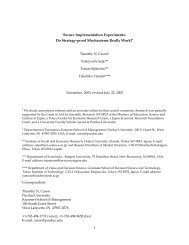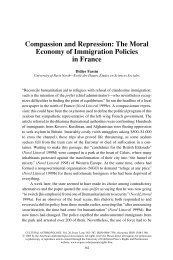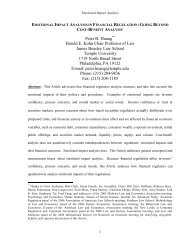Governance, Growth, and Development Decision-making - School of ...
Governance, Growth, and Development Decision-making - School of ...
Governance, Growth, and Development Decision-making - School of ...
Create successful ePaper yourself
Turn your PDF publications into a flip-book with our unique Google optimized e-Paper software.
has failed. It suffices to say here that if the Washington Consensus<br />
has failed, it has certainly not done so because prescriptions such as<br />
reducing inflation <strong>and</strong> budget deficits <strong>and</strong> enforcing property rights<br />
were bad ideas; if it has failed, this is much more likely to have been<br />
because it did not pay attention to the political economy constraints<br />
inherent in policy<strong>making</strong>.<br />
The more important point is that there is a real danger that the<br />
next decade or so might witness a resurgence <strong>of</strong> various forms <strong>of</strong> industrial<br />
policies under one disguise or another. Industrial policy will<br />
only make the political economy problems facing developing countries<br />
worse. The job <strong>of</strong> the World Bank must be to discourage such<br />
policies. Industrial policy is not only <strong>of</strong>ten based on bad economics,<br />
but much more importantly, it is based on bad politics.<br />
5. <strong>Growth</strong> Is Hard, or Impossible, without<br />
Public Goods<br />
The emphasis on reducing the size <strong>of</strong> the government <strong>and</strong> limiting<br />
various different forms <strong>of</strong> government intervention that <strong>of</strong>ten<br />
lead to distorted incentives in the marketplace <strong>and</strong> to corruption is<br />
right. Nevertheless, the focus on these problems should not blind<br />
us to another important set <strong>of</strong> barriers to economic growth in poor<br />
economies: lack <strong>of</strong> infrastructure, roads, sanitation, basic educational<br />
institutions, <strong>and</strong> law <strong>and</strong> order for the citizens. In almost all<br />
<strong>of</strong> the poor <strong>and</strong> stagnant economies the government is not only corrupt<br />
<strong>and</strong> in the business <strong>of</strong> favoring special groups at the expense <strong>of</strong><br />
the society at large, but it also fails in the provision <strong>of</strong> the most basic<br />
public goods to the large majority <strong>of</strong> its population. Modern economic<br />
growth requires a broad base <strong>and</strong> the mobilization <strong>of</strong> such a<br />
broad base is impossible without the relatively widespread provision<br />
<strong>of</strong> some <strong>of</strong> the most basic public goods.<br />
The World Bank is <strong>of</strong>ten involved in programs that invest in<br />
public goods. Not all such programs are cost-effective <strong>and</strong> some may<br />
lead to waste. But we should still not lose sight <strong>of</strong> the general importance<br />
<strong>of</strong> public good provision <strong>and</strong> how the absence <strong>of</strong> the most<br />
<br />
<strong>Governance</strong>, <strong>Growth</strong>, <strong>and</strong> <strong>Development</strong> <strong>Decision</strong>-<strong>making</strong>
















